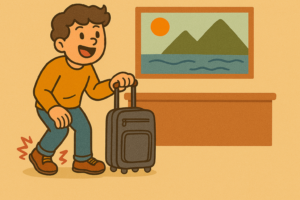Ever wondered why someone talking about travel plans mentions their feet are itchy? No foot cream needed!
A strong desire or restlessness to travel, explore new places, or make a significant change in location.
Have you ever been confused when someone mentioned having “itchy feet” during a conversation about vacation plans?

This common English idiom might sound like a medical condition at first glance, but it actually captures that powerful feeling of wanderlust we experience when longing for new adventures.
Many English learners initially misinterpret this phrase literally, leading to some amusing misunderstandings.
However, once you understand the metaphor, you’ll appreciate how perfectly it describes that exciting urge to explore unfamiliar places and break free from routine.
What Does This Idiom Mean?
The idiom “have itchy feet” means having a strong desire to go somewhere different or embark on an adventure.
It’s as if your feet are so restless that you simply can’t stay in one spot.
When people say they have itchy feet, they’re not talking about a literal medical problem. They’re describing the powerful sense of wanderlust that nudges them toward new horizons.
Usage & Practical Examples
- In the Workplace
Imagine you’ve been in the same role for years, and you feel it’s time for a change. You could say, “I have itchy feet and need to explore new projects,” letting others know you’re ready for something fresh. - Among Friends
You might be at a gathering, daydreaming about a road trip you’ve always wanted to take. Telling your friends, “I’ve got itchy feet,” conveys your excitement about exploring somewhere you’ve never been. - Travel Plans
Perhaps you’ve lived in one city for too long and crave a completely different environment. Saying, “My itchy feet are pushing me to move abroad,” captures that urge to discover an unfamiliar culture.
A Comedic Anecdote
One classic misunderstanding happens when English learners hear “I have itchy feet” and misinterpret the phrase literally.
They might offer foot cream or suggest a trip to the doctor, leading to a humorous moment when they learn it’s all about wanting to travel.
This type of confusion highlights how idioms can puzzle even advanced learners.



Once you realize it’s about wanderlust rather than a foot condition, it’s easier to use the expression naturally in conversation.
History of “Have Itchy Feet”
The exact origin of this idiom is unclear, but it’s been part of English vernacular since at least the early 20th century.



Some theories suggest it arose from the discomfort caused by wearing tight shoes, leading people to want to walk around or change their location.
Regardless of how it began, the phrase has endured because it vividly describes the restlessness associated with staying in one place for too long.
Even in today’s world, where you can book an international flight with a few taps on a phone, the feeling of having itchy feet remains universal.
Case Study: Sarah’s Journey
- Persistent Restlessness
Sarah spent her entire life in one bustling city. Although everything seemed fine, she felt an unshakable longing to discover places beyond her familiar surroundings. - Initial Misunderstanding
When Sarah first heard the phrase “have itchy feet,” she believed it was a literal skin condition. Amused friends explained it actually meant having a strong drive to travel, causing much laughter when she realized her mistake. - A Bold Decision
Embracing her restless spirit, Sarah decided to move to another country. She left behind her daily routine, excited to see what life could be like far away from home. - Newfound Fulfillment
In her new environment, Sarah was thrilled to explore different cultures and meet interesting people. This adventure taught her that when someone says they have itchy feet, it can be a sign they’re ready for something truly transformative. - Practical Applications
Sarah’s experience shows that recognizing this desire can motivate you to break from familiar settings. Whether it’s relocating or taking a meaningful vacation, having itchy feet can lead to expanded horizons and personal growth.
Related Expressions
Understanding “have itchy feet” can open the door to other idioms and phrases that enrich your English. Below are a few related expressions that capture similar feelings or contrast with this desire to explore.
- Get the Travel Bug
- This expression suggests catching a figurative “bug” that leaves you craving more journeys.
- If someone says, “I got the travel bug after visiting Paris,” they mean they’re eager to plan future trips.
- Wanderlust
- This term refers to an intense passion for roaming or traveling.
- People with wanderlust often plan getaways or spontaneous adventures whenever possible.
- Settle Down
- Often considered the opposite of having itchy feet.
- While some people love roaming, others yearn to settle down and build a stable life in one location.
These phrases complement each other in illustrating the different levels of enthusiasm people have for travel or staying put.
Choosing which one to use depends on whether you’re describing your own restlessness or talking about someone who prefers tranquility.
John’s Realization
John was content living in the same small town for years, satisfied with his daily routine. Everything changed when he encountered a seasoned traveler who shared stories of distant lands and vibrant cultures.
At first, John misunderstood “have itchy feet” and thought people were discussing an actual physical itch. When he learned the phrase referred to an urge to see the world, he recognized his own hidden curiosity for distant places.
Inspired by the traveler’s tales, John discovered his longing for something more than his familiar surroundings. Once he embraced the concept, he found himself booking a flight and stepping beyond the life he had always known.
Common Pitfalls & Notes
- Literal Interpretation
Misunderstanding the idiom as an actual foot problem can lead to funny scenarios. If someone offers you medical advice when you mention “itchy feet,” reassure them that you’re just excited to travel. - Exaggeration
Saying you have itchy feet doesn’t mean you’re constantly on the move. It simply indicates a restlessness or eagerness for new experiences and possibly relocating or vacationing. - Cultural Nuances
Remember that idioms don’t always translate smoothly into other languages. If you’re explaining “have itchy feet” to someone unfamiliar with English expressions, use context so they catch your intended meaning.
Pop Quiz: Check Your Idiom Skills
Have Itchy Feet

Tips to Master This Idiom
Learning idioms such as “have itchy feet” can make your English more vivid and relatable. Here are a few strategies to help you seamlessly integrate this and other idioms into your everyday speech:
- Observe Native Speakers
Watch how they use the phrase in casual conversation.
You’ll notice the tone and context, making it easier to remember and apply correctly. - Practice in Real-Life Scenarios
If you’re feeling restless, mention to a friend or coworker, “I have itchy feet.”
Notice how they respond, and keep the conversation flowing to reinforce your understanding. - Keep a Personal Dictionary
Maintain a small notebook or a digital file of idioms and short phrases.
Review them regularly, adding examples of how each idiom appears in real-life sentences.
By applying these tips, you’ll gain confidence using idioms without overthinking how they fit into a given context. Soon, “have itchy feet” will feel as natural to you as saying “I’m excited to travel.”
Key Takeaways
The idiom “have itchy feet” reveals a strong desire to explore, move, or travel. Although it may cause a few laughs when taken literally, this phrase perfectly captures the spark that drives people to seek new experiences.
Below is a concise reminder of why understanding it can be so helpful:
- Expanding Your Expression
Using “have itchy feet” allows you to articulate restlessness in a lighthearted way.
Instead of simply saying, “I want to travel,” you highlight your eagerness more vividly. - Avoiding Confusion
Recognizing this idiom protects you from the embarrassment of thinking someone needs medical help.
You’ll save yourself from offering foot cream in a conversation about travel plans. - Deepening Cultural Insight
English idioms often offer a glimpse into cultural habits and humor.
“Have itchy feet” provides an instant connection to how many English speakers express wanderlust.
When you master an expression like this, you boost your conversational skills and open the door to more natural, engaging dialogue.
Keep exploring new words, phrases, and idioms to enrich your language abilities and enjoy a more nuanced way of communicating.









Comment